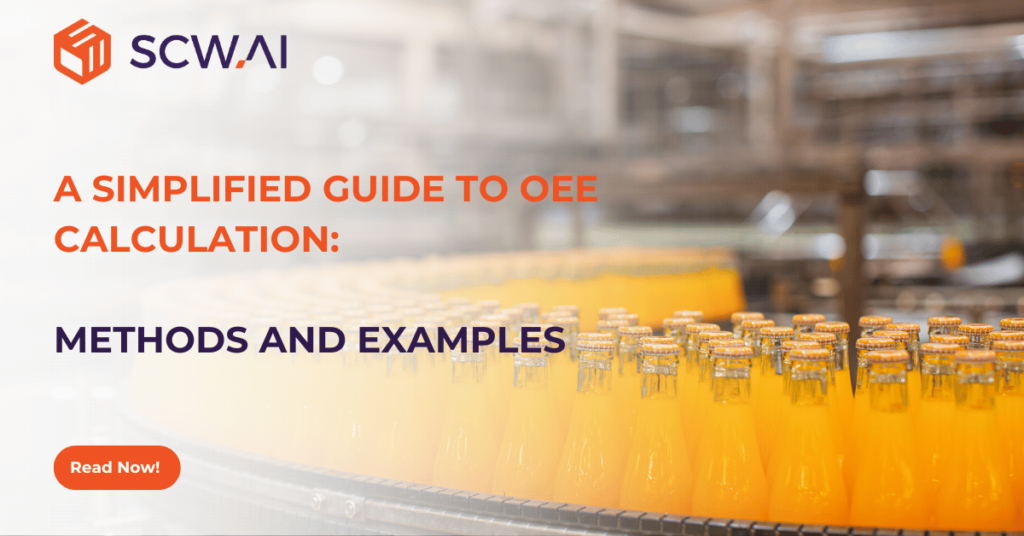According to Accenture, cloud manufacturing has the potential to improve asset utilization by up to 15%, labor productivity by up to 40%, and throughput by up to 25%. Despite the significant business returns within a short time frame and at a reasonable cost, a Deloitte study revealed that many manufacturers have not invested in cloud computing.
We believe that a lack of knowledge about cloud manufacturing may be the reason for the limited adoption of cloud tools. Most articles only offer surface-level information, focusing on cloud computing for generic use cases. This article, however, will concentrate solely on cloud solutions for manufacturing. It will provide industry-specific use cases, introduce a cloud-driven factory transformation, and offer best practices to guide manufacturing managers on maximizing their return on cloud manufacturing investments.
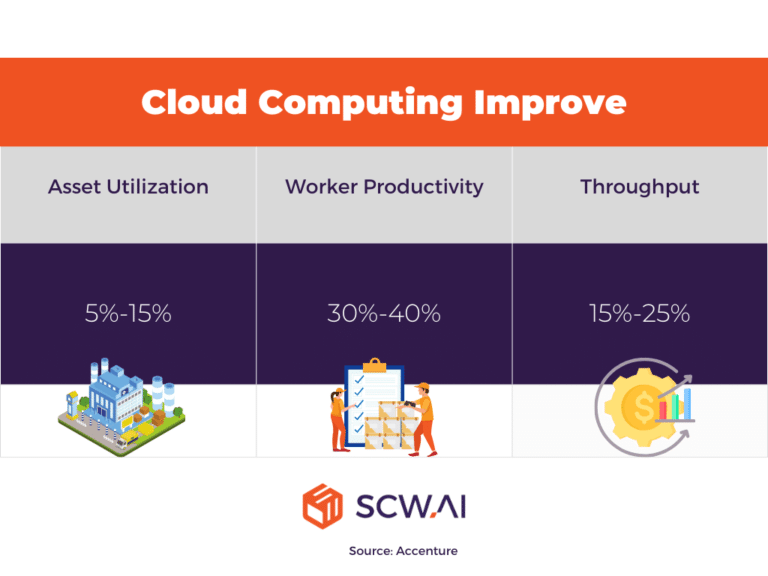
What Is Cloud Manufacturing
Cloud manufacturing involves the utilization of digital factory solutions via the internet, adopting a pay-as-you-go mentality. Consequently, manufacturing companies do not need to design, test, or maintain digital tools, nor do they need to invest in data centers, servers, cybersecurity tools or other hardware products. Most of the time, the only requirement to utilize cloud manufacturing solutions is having internet access and a computer, tablet, or smartphone. Thus, manufacturers benefit from computing, data management, data security and interpretation services provided by their technology vendor.
To explain what cloud manufacturing entails, we often use the example of Google Drive, which is indeed a cloud solution that allows users to collaborate on Excel sheets, presentations, forms, and more. Users can decide whom to collaborate with and whom to exclude from the project, and with just an internet connection, numerous applications become easily accessible.
The same principle applies to cloud manufacturing. As we will delve into detail, manufacturers can benefit from predictive maintenance, labor tracking, OEE analysis, replacing paper with digital logbooks for documentation, and many more functionalities by utilizing cloud tools that are crafted for manufactures.
6 Benefits of Cloud Manufacturing
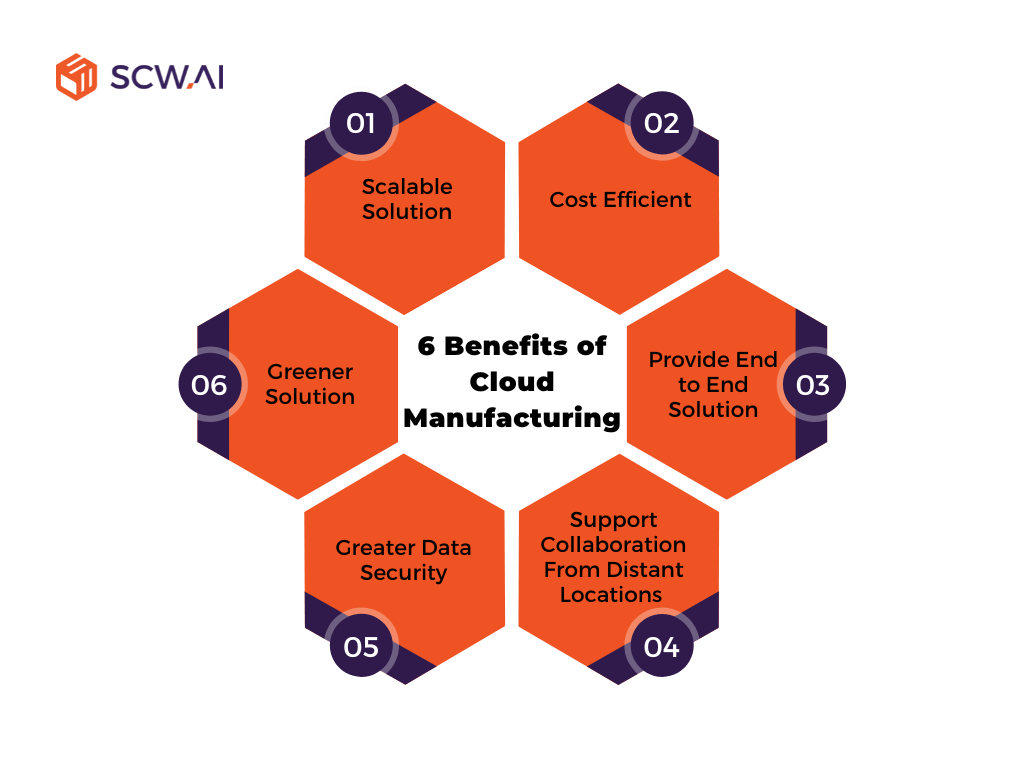
1. Scalable Solution
Cloud solutions are the most convenient way for manufacturers to augment traditional lean activities through digitalization, especially for those lacking a dedicated IT/developer team or a robust IT infrastructure, which is often the case for typical manufacturers. Many cloud providers for manufacturers, including SCW.AI, promise fully digital factories in under 100 days.
If manufacturers decide to go digital via cloud tools, they can start with a pilot to demonstrate the business benefits in action. Then, if factories decide to scale up, solution deployment takes just a few weeks.
In cases where your business expands, you can simply upgrade your subscription by communicating with your vendor. For example, if you begin your digitalization journey by utilizing, let’s say, the OEE Tracker to make data-driven decisions regarding the availability, performance, and quality of your production, and later you want to monitor maintenance activities regarding the lines and machines, you can start using the Maintenance Performance Report by informing your vendor.
Furthermore, cloud manufacturing providers constantly add new features to their platform. For instance, in 2023, SCW.AI developed a new feature every week. If some of these new features are tempting for you as a manufacturer, you can start using them immediately by changing your subscription.
2. Cost Efficient
With no requirement for substantial hardware investment, cloud solutions present a cost-efficient approach to digital transformation. This financial advantage enables companies to allocate resources strategically and invest in other critical areas.
Additionally, the skilled labor shortage in manufacturing is a known issue. Employees with good coding skills often prefer jobs outside of manufacturing unless they are paid higher than the market average. This situation negatively impacts manufacturer’s capabilities for in-house digitalization as well as digitalization via low-code platforms that require writing some code for development.
Digital factory transformation with cloud tools requires no coding, thus it further reduces the cost of the process.
3. Provide End to End Solution
Many cloud manufacturing tools, including SCW.AI’s Digital Factory, offer a comprehensive solution package tailored to the needs of manufacturers, encompassing:
- Visibility and productivity solutions
- Planning and scheduling solutions
- Paperless manufacturing solutions
- Green factory solutions
- Supply chain and inventory management solutions and more.
As a result, a single technology provider can address all your digitalization needs, centralizing your data storage and management within one tool. This facilitates effective communication between departments and maximizes the return on digitization efforts.
4. Support Collaboration From Distant Locations
According to a recent Gallup Survey 9 out of 10 workers prefer hybrid working environments, necessitating manufacturers to reconsider their work arrangements, especially for engineers.
Cloud manufacturing solutions make it possible to track production from outside the factory. Through an internet connection, executives can monitor their factories in real-time from any location. Moreover, many cloud providers deploy manufacturing apps with notification and alert capabilities. Thus, production engineers can be informed when a line stops working or which employees are checked in for a certain line by just carrying their smartphones. Surely, such flexibility provides a benefit for manufacturers to find and retain highly skilled workers.
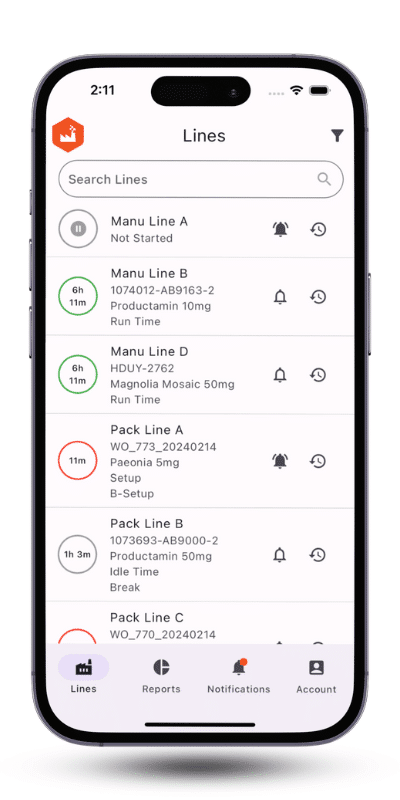

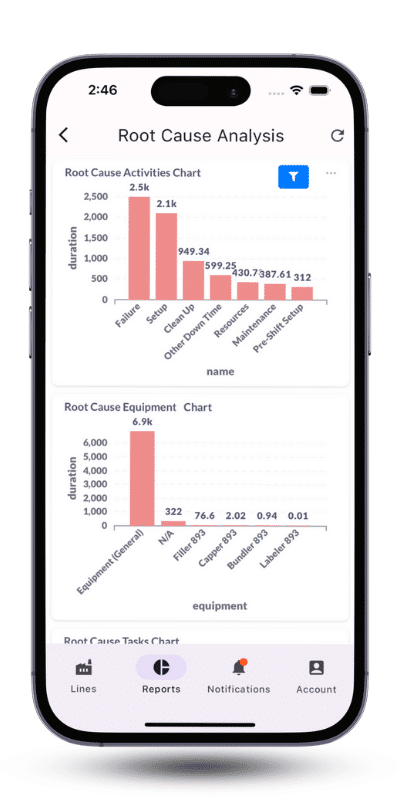
5. Greater Data Security
Although there is a rumor that claims cloud solutions tend to be problematic for data security, the opposite is true if the cloud manufacturing provider puts effort into data protection. Zero trust architecture constitutes the core of securing data, per McKinsey. It implies that if users are always verified, ideally via multi-factor authentication, and the cloud platform allows access management via predefined roles, then the probability of data leakage can be lower compared to in-house solutions.
6. Greener Solution
According to an Accenture analysis, migrating in-house digital solutions to the cloud for all businesses can lead to a decrease of around 6% in IT emissions. To give you a perspective, impact is equivalent to removing 20 million cars annually.
The reason behind this lies in the economies of scale and the laws of thermodynamics. IT emissions are mostly related to electricity usage that powers software, hardware, and cooling systems. If you centralize a large hardware infrastructure in one location, such as a cloud manufacturing provider, the energy consumption for cooling the system will be smaller compared to cooling many smaller hardware units individually. Thus, cloud manufacturing can contribute to the green transition of factories.
9 Applications of Cloud Computing In Manufacturing Industry
In this section, we will continue with the top 9 use cases of cloud computing in manufacturing. It is important to mention that we purposely excluded generic applications of cloud computing in marketing, sales, and finance, and solely focused on its use cases for shop floor and supply chain activities.
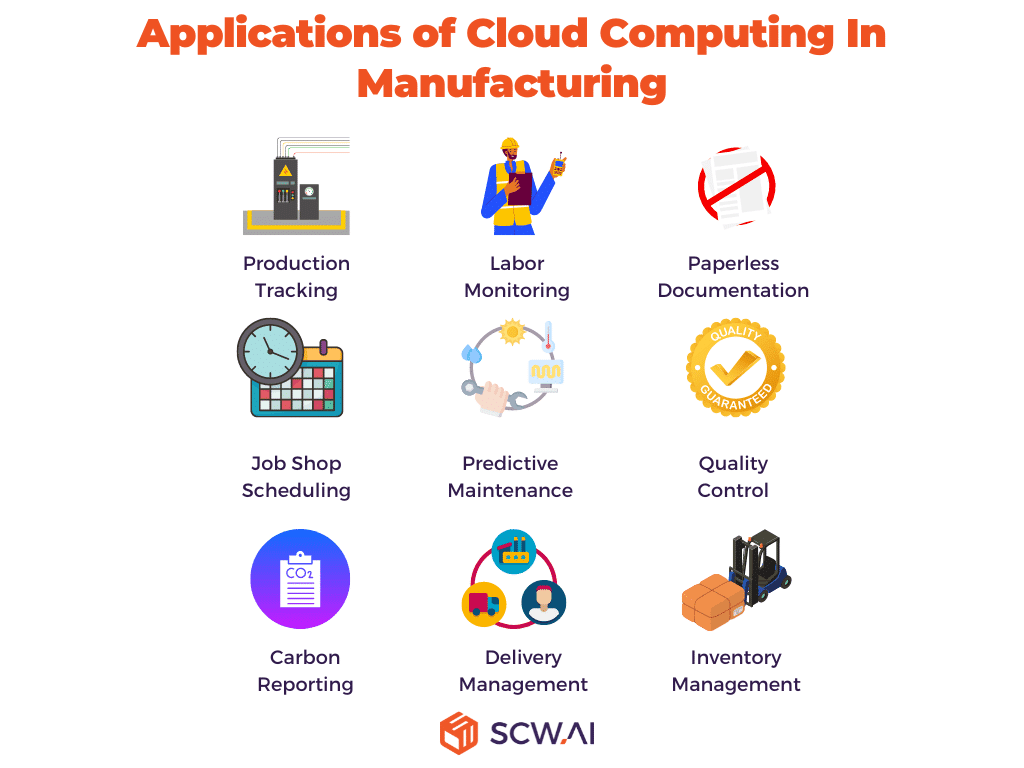
1. Production Tracking
Cloud manufacturing solutions facilitate granular real-time data interpretation through automated reports and dashboards. For instance, an executive can monitor:
- Which lines are down, idle, or running.
- The OEE performance of lines or machines, whether they are below or performing well.
- The performance of lines in terms of production speed (cycle time, takt time, etc.).
- The ratio of good count to total count for specific lines and machines, and so on.
Therefore, executives can intervene in real-time production bottlenecks by harnessing data. Additionally, reviewing such reports can help factories identify chronic issues with lines and machines that cause inefficiencies, enabling them to take corrective actions.
2. Labor Monitoring and Augmentation
Similar to monitoring line and equipment activities, cloud manufacturing tools assist factory managers in monitoring labor activities and taking data-driven actions to optimize workforce utilization. Through automated reports, manufacturers can observe:
- Weekly hours spent by individual workers
- Performance of each worker in machine setup compared to the factory average
- Performance of each worker in line cleaning tasks
- Areas of expertise of each worker in terms of lines, equipments, and products,
By analyzing such data, manufacturers can arrange tailored training for each worker, assign tasks based on their performance, and consequently increase labor productivity.

3. Paperless Documentation
Whether for internal or external audits, manufacturers need to document their activities. In industries with strict regulations, such as the pharmaceutical industry, documentation activities on traditional paper can consume up to one third of an operator’s time.
Paperless manufacturing solutions, equipped with form templates, automated calculations, and partially automated data gathering from shop floors, reduce the time needed for data entry by 50% to 80%. Automated calculations and the completion of mandatory areas improve the quality of documentation. Each log is filled out by a user verified in the system and approved by an admin, increasing accountability.
Finally, utilizing paperless manufacturing solutions assists in the internal and external audit process since data is always audit-ready and securely stored in a digital environment.
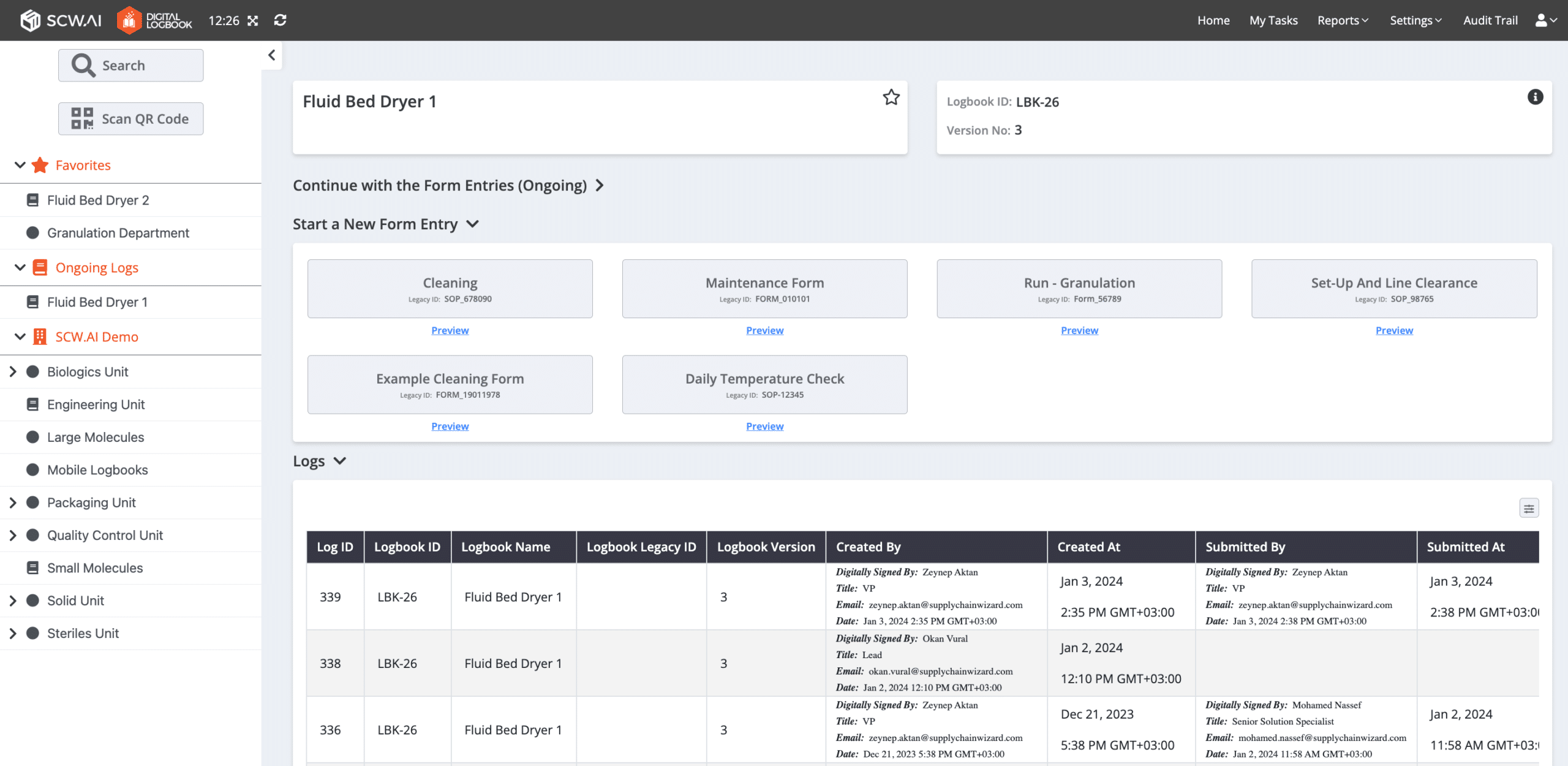
4. AI-driven Job Shop Scheduling
Cloud manufacturing vendors are designing AI algorithms tailored to the specific needs of manufacturers, including automated and effective solutions for job shop scheduling.
Referred to as advanced planning and scheduling tools, cloud-driven AI schedulers are agile solutions that can address various scheduling needs of manufacturers, such as:
- Minimization of makespan
- Maximization of OTIF (On-Time-In-Full) performance
- Just-in-time delivery, and more.

To learn more about AI application on manufacturing you can read our Top 5 AI Use Cases in Manufacturing article.
5. Machine Learning Driven Predictive Maintenance
Another AI-driven solution provided by cloud manufacturing vendors is machine learning-driven predictive maintenance. By interpreting equipment data such as Mean Time to Failure, Mean Time to Repair, and Mean Time Between Failures, algorithms can predict equipment breakdowns and notify employees before they occur, allowing preventive measures to be taken to maximize machine runtime.
According to Deloitte, this strategy improves operational time of the lines by between 10% and 20%.
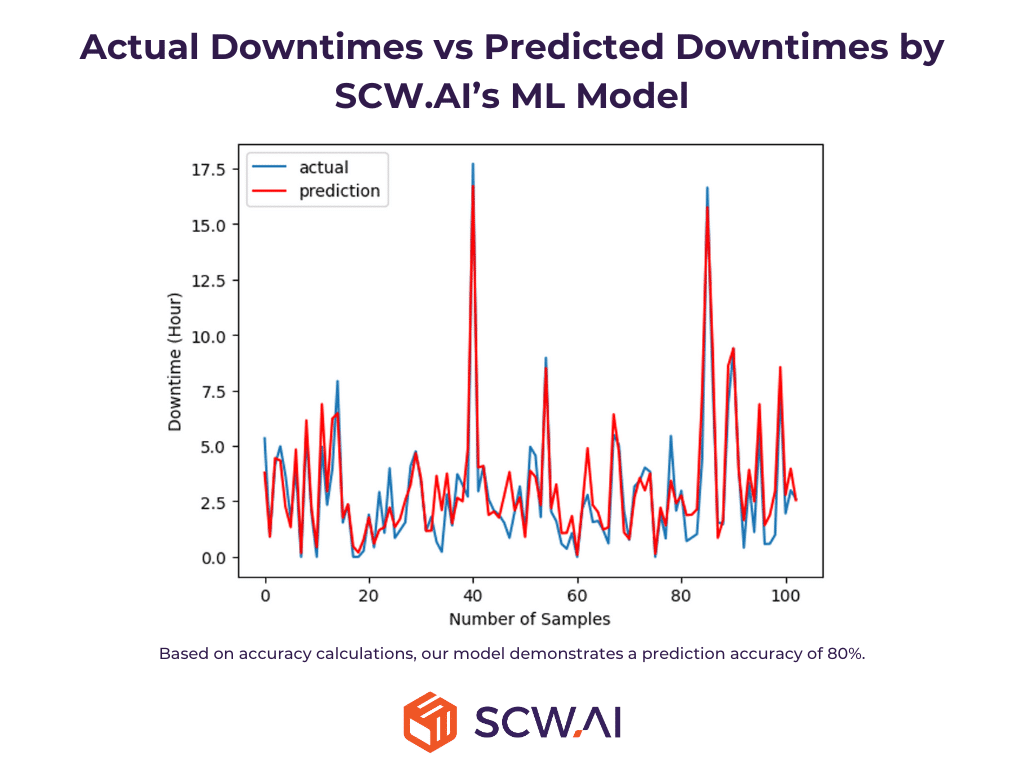
6. Quality Control
Cloud manufacturing vendors design computer vision models that monitor the quality of production. These models can be supervised via image labeling to distinguish between scrap and quality products. Thus, manufacturers can automatically eliminate scrap goods and optimize production quality.

7. Automated Carbon Reporting
After the Paris Agreement governments forced producers to change their way of doing business in a more sustainable way. To improve corporate sustainability manufacturers must measure their carbon footprint and take actions to address their environmental pin points.
Cloud base carbon trackers automate the calculation of GHG emissions. These tools automatically multiply activity-specific carbon emissions by the unit of business activity (kilowatt, gallon etc). For example, a transportation activity consuming 27,000 gallons of gasoline creates a carbon footprint of approximately 240 tons, considering the operation-specific emission factor for a gallon of gasoline is 0.008887 metric tons according to the US Environmental Protection Agency. By connecting factory and supply chain databases with carbon trackers, manufacturers can streamline calculation and reporting of their scope 1 and scope 2 emissions.
8. Delivery Management
Cloud manufacturing improves supply chain management through:
- Real-time visibility: See inventory levels across your entire supply chain.
- Improved forecasting: Generate more accurate demand forecasts to optimize production planning.
- Streamlined communication: Collaborate better with suppliers and distributors for faster response times.
9. Inventory Management
Cloud manufacturing empowers manufacturers with data-driven inventory management. Real-time insights into inventory levels, production schedules, and supplier lead times enable manufacturers to optimize stock levels. Cloud platforms can generate automatic purchase orders when inventory dips below a predefined threshold, ensuring a just-in-time approach and minimizing storage costs.
Cloud Computing Manufacturing Case Study
Kordsa Composite revolutionized their factory by utilizing our cloud based Digital Factory Platform. Collaboration has delivered following benefits for Kordsa:
- Maximize run time via dashboards, alerts, scheduling algorithms and predictive maintenance.
- Increase productive time of workers by starting paperless manufacturing with Digital Logbook.
- Enhanced capacity with OEE Tracker and Labor Tracker. Korsa exceeded their targets by 8 months ahead.
- Enhance sustainability by reducing waste.
You can find out more details about How Kordsa digitized their shop floor with our cloud tools by clicking here.
4 Best Practices for Finding Correct Cloud Provider
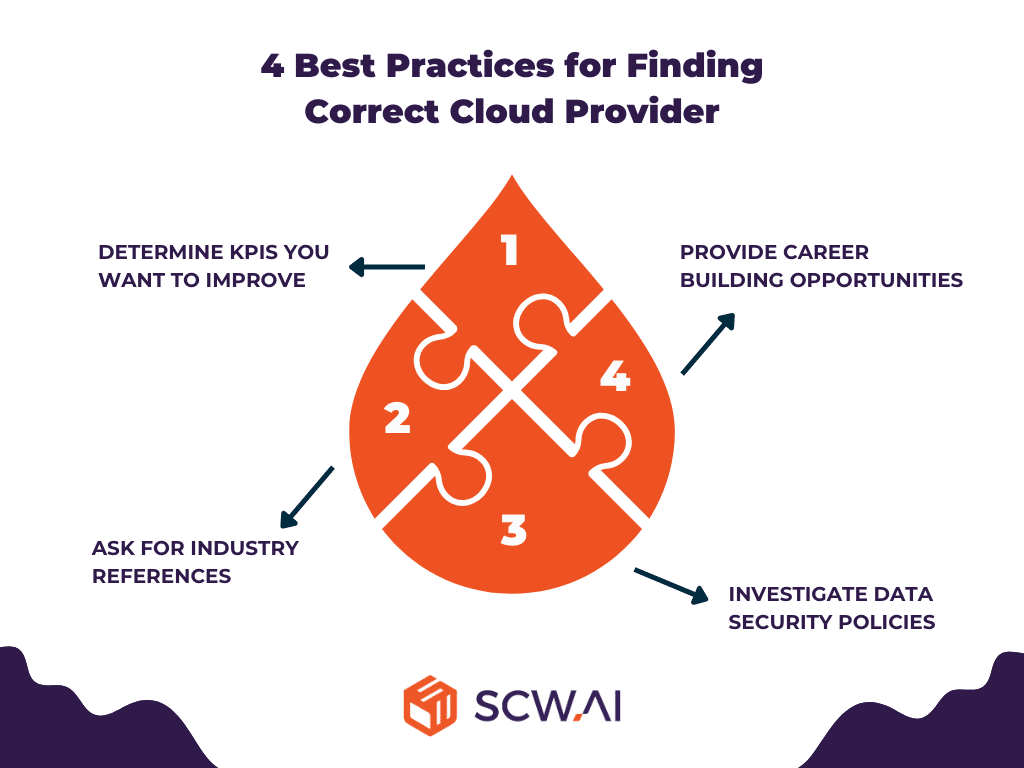
1. Determine KPIs You Want to Improve
As demonstrated in this article, cloud manufacturing tools have a wide range of applications. Therefore, many vendors offer tools for specific use cases, such as schedule adherence, OEE, or carbon accounting. If you can decide which specific manufacturing KPIs you want to improve, that decision can help you reduce the number of potential technology vendors.
We prepared a Manufacturing KPIs Handbook with over 60 KPIs and formulas. You can download and utilize for your operations now!
2. Ask for Industry References
Many cloud providers design generic tools. As a first step, check whether their tools are specifically designed for the manufacturing industry, as the shop floor environment differs significantly from other business environments.
Secondly, due to different regulations and necessities, there are significant differences between sectors within manufacturing. For instance, the needs of a textile factory and a defense industry factory in terms of data protection and business practices differ. Therefore, check your potential vendor’s references and ensure they have experience working with your sector.
3. Assess the Customer Success Policy
Effectively utilizing digital solutions can pose a challenge for your employees, potentially resulting in the partial realization of expected business benefits. To fully grasp the advantages of digitalization, the quality of the Customer Success Team is crucial. This team guides your workers in navigating the intricacies of digital tools, ultimately enhancing ROI.
It is a well-known fact that many technology vendors lack such qualities or may impose additional high fees on customers. Therefore, it is advisable to thoroughly examine the customer support policies of technology vendors before entering into a partnership.
4. Investigate Data Security Policies
Ask your potential vendors whether they have ISO 27001 and ISO 27017 data security certificates. Depending on your industry, you might also inquire about other certificates. For instance, for a pharmaceutical company, it is important that the tool they use is GMP compliant.
By doing so, you can ensure the protection of your intellectual property and compliance with regulations following the digital transformation.
Transform Your Factory with SCW.AI’s Cloud Digital Factory Platform
SCW.AI digitizes manufacturers of all sizes in 100 days or less through its cloud-based Digital Factory Platform. We ensure end-to-end digitalization, meaning that from production tracking to labor monitoring, AI-based scheduling to paperless manufacturing, our platform can address a variety of needs thanks to its comprehensive modules.
To experience the power of the Digital Factory, book a demo today.

